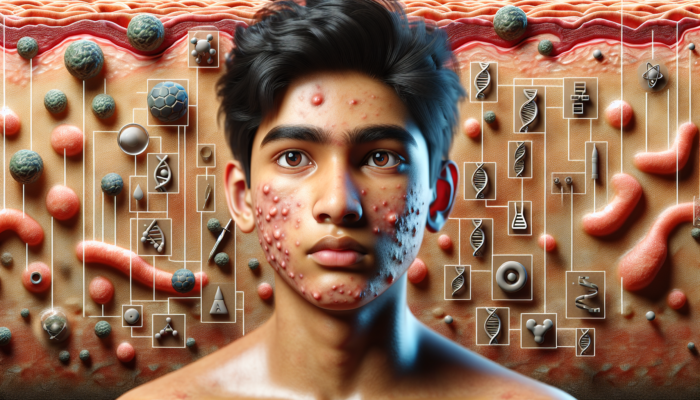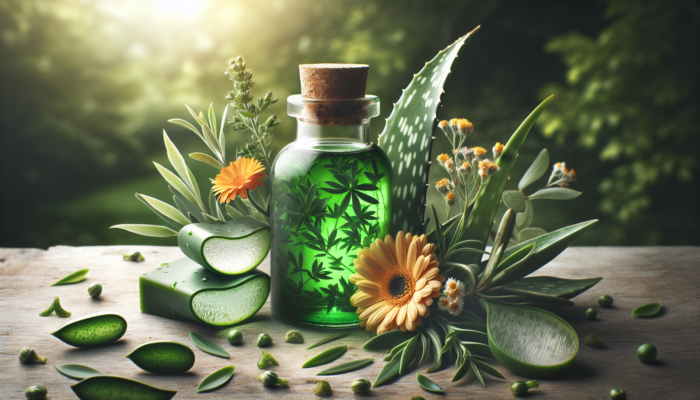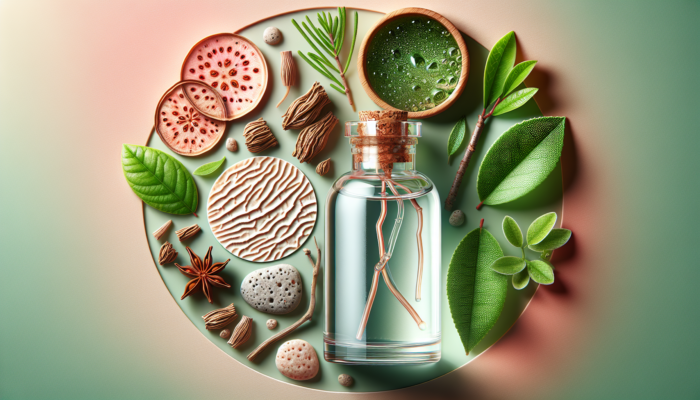Unlock the Full Potential of Herbal Solutions for Effective Teen Acne Management
In the contemporary landscape, there is a noticeable increase in interest surrounding herbal solutions for teen acne. Unlike conventional treatments that often cause skin irritation and harsh side effects, these natural alternatives offer a gentler approach with a significantly lower risk of adverse reactions. Many teenagers, along with their parents, are now gravitating towards holistic methods that not only address the visible signs of acne but also enhance the overall health of the skin. Herbal remedies leverage the power of nature, providing a rich spectrum of antioxidants, anti-inflammatory agents, and essential components that aid in skin repair and rejuvenation, ultimately contributing to clearer and healthier skin.
Throughout adolescence, teenagers frequently encounter various skin challenges such as acne, which can profoundly impact their self-esteem and body image. Gaining a comprehensive understanding of the numerous underlying factors contributing to acne is crucial, as this knowledge forms the foundation for effective treatment strategies. The triggers of acne are often multifaceted, closely tied to hormonal fluctuations during puberty, genetic influences, and lifestyle elements, including diet and stress levels. As adolescents navigate hormonal changes, the sebaceous glands can become overstimulated, leading to excessive oil production that clogs pores and results in acne breakouts.
When exploring new treatments, prioritizing safety is essential. Conducting a patch test before applying any herbal remedy to the entire facial area is critical, as allergic reactions may occur unexpectedly. Additionally, consulting with a dermatologist before starting any new treatment regimen is highly recommended, especially for individuals with sensitive skin or pre-existing conditions. This precaution helps ensure that the chosen remedies are appropriate and safe for each individual's unique skin characteristics.
Delving into the Intricate Causes and Triggers Behind Acne Breakouts

Acne is a complex skin condition that manifests in various ways across individuals. A multitude of factors contributes to the onset of acne, with hormonal shifts during adolescence playing a significant role. These hormonal changes often lead to increased oil production, which, when combined with dead skin cells, can clog pores and create an environment conducive to acne development. Furthermore, genetic predispositions are critical; teenagers with a family history of acne are often more vulnerable to similar skin issues.
In addition, certain lifestyle choices can exacerbate the severity of acne symptoms. Diets rich in processed foods and sugars can provoke inflammatory responses in the body, while heightened stress levels can induce hormonal imbalances that worsen acne. Moreover, the application of cosmetics or skincare products that contain harsh chemicals may irritate the skin, resulting in additional breakouts. Understanding these underlying causes is essential for both parents and teenagers who are eager to manage acne effectively through herbal remedies for teen acne.
Discovering the Exceptional Advantages of Herbal Remedies for Acne Management
One of the most compelling benefits of utilizing herbal remedies for teen acne is their natural formulation. An increasing number of adolescents and their families are becoming more discerning about products filled with synthetic chemicals, favoring gentler, plant-based alternatives. Herbal remedies typically contain fewer artificial ingredients, thus reducing the chances of unwanted reactions. Furthermore, these remedies often deliver nourishing benefits that not only tackle existing acne but also enhance the overall vitality and resilience of the skin.
Many of these herbal treatments are rich in antioxidants, which play a vital role in neutralizing harmful free radicals and decreasing inflammation. For instance, extracts like green tea are celebrated for their strong anti-inflammatory properties, making them effective in soothing irritated skin. Additionally, herbal remedies can promote skin healing, minimize acne scars, and help achieve a more even skin tone, ultimately resulting in healthier and more radiant skin.
Crucial Safety Guidelines to Follow When Using Herbal Treatments for Skin Health
While herbal remedies offer numerous benefits, it is essential to approach their application with care. Not all natural ingredients are suitable for every skin type, making it crucial to perform a patch test before applying any new product. This test involves applying a small amount of the remedy to a discreet area of skin to monitor for any adverse reactions before full facial use.
Additionally, seeking the guidance of a dermatologist can provide valuable insights regarding which herbal remedies may be most effective for a teenager’s specific skin type and condition. It is also essential to remember that while herbal remedies can aid in supporting skin health, they should complement rather than replace conventional treatments recommended by healthcare professionals, particularly in cases of severe acne.
Identifying Powerful Herbal Ingredients That Effectively Combat Acne

When investigating herbal remedies for teen acne, several ingredients stand out due to their proven effectiveness and beneficial properties for skin health. Each herbal component presents unique advantages that can assist in the management and alleviation of acne symptoms, enriching the overall skincare experience.
Utilizing the Antibacterial and Anti-Inflammatory Power of Tea Tree Oil
Tea tree oil is widely recognized as one of the most powerful herbal ingredients for battling acne. Esteemed for its potent antibacterial and anti-inflammatory properties, tea tree oil is derived from the leaves of the Melaleuca alternifolia plant and has been used for centuries by Indigenous Australians for its therapeutic effects. Its primary benefit lies in its capacity to eradicate acne-causing bacteria, making it a formidable topical treatment for blemishes.
Upon application to the skin, tea tree oil penetrates deeply into the pores, significantly reducing inflammation and aiding in the reduction of redness and irritation commonly associated with acne. Furthermore, it helps regulate oil production, making it particularly advantageous for individuals with oily skin. However, due to its concentrated nature, tea tree oil should always be diluted with a carrier oil, such as jojoba or coconut oil, before application to prevent any potential skin irritation.
Harnessing Aloe Vera for Its Natural Healing and Soothing Benefits
Aloe vera emerges as another highly effective ingredient in herbal remedies for teen acne. Renowned for its soothing and healing properties, aloe vera gel is extracted from the leaves of the succulent plant. Its anti-inflammatory and antimicrobial characteristics make it an ideal treatment for acne-prone skin, alleviating irritation while promoting skin recovery.
Beyond its immediate calming effects, aloe vera can assist in the healing of acne scars, gradually diminishing their visibility over time. Its hydrating properties help maintain skin moisture without clogging pores, making it suitable for various skin types. Incorporating aloe vera into a daily skincare routine can significantly improve skin texture and clarity, contributing to an enhanced overall appearance.
Utilizing Witch Hazel: A Natural Astringent with Multifaceted Benefits

Witch hazel is a natural astringent derived from the bark and leaves of the witch hazel plant. It is particularly effective in managing excess oil production, making it a valuable addition to the arsenal of herbal remedies for teen acne. Witch hazel can help prevent future breakouts while enhancing overall skin tone by tightening the skin and minimizing pore size.
In addition to its astringent properties, witch hazel also possesses anti-inflammatory traits that can soothe irritated skin and reduce redness associated with acne. When used as a toner, it refreshes the skin and removes lingering impurities, preparing it for subsequent treatments. Incorporating witch hazel into a skincare routine can effectively assist in managing acne while improving the skin’s overall appearance.
Crafting Personalized Herbal Remedies for Effective Acne Management
Creating homemade herbal remedies for teen acne can be both a rewarding endeavor and an effective strategy for addressing skin concerns. These DIY solutions empower individuals to take control of the ingredients they use, tailoring treatments to meet their specific skin needs. Here are some straightforward yet impactful recipes that can easily be integrated into your skincare routine.
DIY Tea Tree Oil Face Wash for Optimal Acne Control
Developing a homemade tea tree oil face wash is a fantastic way to leverage the benefits of this powerful ingredient while adhering to a natural skincare regimen. Begin with a gentle liquid castile soap as the base, which cleanses the skin without stripping it of its natural oils. Add a few drops of tea tree oil into the soap and mix thoroughly to combine the ingredients.
This face wash can be used daily to cleanse the skin, effectively eliminating dirt, oil, and makeup while combating acne-causing bacteria. Rinse thoroughly with lukewarm water and follow up with a moisturizer to ensure skin hydration. Consistent use of this face wash can lead to noticeable improvements in skin clarity and texture over time.
Soothing Aloe Vera and Honey Mask for Acne Relief
The combination of aloe vera and honey creates a calming mask that maximizes the healing properties of both ingredients. To prepare this mask, mix equal parts of fresh aloe vera gel and raw honey. Apply the mixture to the face, focusing on areas prone to breakouts, and leave it on for approximately 15 to 20 minutes.
Honey is well-known for its antibacterial properties, while aloe vera provides soothing and hydrating effects on the skin. This mask can be utilized once or twice a week to promote healing and alleviate inflammation, offering a natural remedy that leaves the skin feeling soft, refreshed, and rejuvenated.
DIY Witch Hazel Toner for Achieving Balanced Skin
Creating a witch hazel toner is a simple yet effective way to elevate your skincare routine. Combine witch hazel with distilled water in a spray bottle, maintaining a 1:1 ratio for optimal results. For added benefits, consider infusing the mixture with a few drops of essential oils, such as lavender or tea tree oil.
After cleansing your face, spritz the toner onto your skin or apply it with a cotton pad. This toner effectively manages oiliness, reduces the visibility of pores, and provides a refreshing boost to the skin. Regular use can lead to a more balanced complexion, making it an essential component of a teenager's skincare regimen.
Holistic Approaches: Merging Lifestyle and Diet for Comprehensive Acne Management
While topical treatments play a crucial role in managing teen acne, lifestyle and dietary choices significantly influence overall skin health. By making informed decisions in these areas, teenagers can enhance the effectiveness of their herbal remedies and support clearer skin from the inside out.
Nutrition Strategies for Achieving Radiant Skin
A diet rich in whole foods, particularly those abundant in antioxidants and omega-3 fatty acids, can provide substantial benefits for skin health. Foods such as berries, leafy greens, nuts, and fatty fish help minimize inflammation and support the skin's healing processes. Antioxidants play a critical role in neutralizing free radicals that can damage skin cells and contribute to acne.
Incorporating nutrient-dense foods like avocados and sweet potatoes can supply essential vitamins and minerals that promote a radiant complexion. Additionally, limiting processed foods and sugar intake can help avoid blood sugar spikes that are known to trigger acne flare-ups. A balanced diet nourishes not only the skin but also enhances overall well-being.
The Essential Role of Hydration for Optimal Skin Health
Hydration is often overlooked when it comes to maintaining clear skin. Consuming adequate amounts of water throughout the day is vital for flushing out toxins from the body, which in turn minimizes the likelihood of breakouts. When the body is properly hydrated, the skin can retain its elasticity and overall health.
Encouraging teenagers to drink at least eight glasses of water daily can significantly enhance their skincare efforts. Additionally, herbal teas can serve as an excellent alternative, delivering extra antioxidants that benefit skin health. Staying hydrated contributes to a luminous complexion and supports the optimal functioning of bodily systems.
Implementing Effective Stress Management Techniques to Promote Healthier Skin
Stress can have a profoundly negative impact on skin health, often exacerbating acne due to hormonal fluctuations and inflammation. Adopting various stress management techniques can be beneficial for teenagers dealing with acne. Practices such as yoga, meditation, and deep-breathing exercises can significantly lower stress levels and promote relaxation.
Encouraging regular physical activity can also be a productive outlet for stress relief. Exercise enhances blood circulation, delivering essential oxygen and nutrients to the skin while aiding in toxin elimination through perspiration. Establishing a balanced routine that incorporates stress-relief activities can significantly improve skin health and overall emotional well-being.
Dispelling Common Misconceptions Surrounding Herbal Remedies for Acne
As interest in herbal remedies for teen acne continues to rise, so do the myths surrounding their use. It is essential to differentiate between fact and fiction to make informed choices regarding acne treatment.
Myth: Herbal Remedies Deliver Instant Results
A prevalent misconception is that herbal remedies yield immediate results. While some individuals may observe quick improvements, the truth is that most herbal treatments require consistent use over time to achieve significant effects. Patience and commitment are vital when incorporating herbal remedies into a skincare routine.
Myth: All Natural Products Are Safe for Everyone
Another widespread myth is that all-natural products are inherently safe for all individuals. While many herbal remedies are gentle, certain natural ingredients can provoke allergic reactions or irritate the skin, particularly in those with sensitive skin. It is crucial to perform patch tests and seek guidance from a dermatologist to ensure that the selected remedies are suitable.
Myth: Herbal Remedies Are Less Effective Than Conventional Treatments
Many people believe that herbal remedies lack the effectiveness of traditional treatments, but this is not necessarily the case. Numerous studies have demonstrated that specific herbal ingredients can be as effective as conventional medications when utilized appropriately. The key lies in selecting the right remedies and integrating them into a consistent skincare routine.
Expert Insights on Navigating Herbal Remedies for Teen Acne
Insights from dermatologists and skincare professionals can provide invaluable guidance when exploring herbal remedies for teen acne. These experts can offer recommendations that assist teenagers in achieving clearer skin while adhering to a healthy skincare routine.
Dermatologists' Recommendations for Successful Acne Management
Many dermatologists endorse the inclusion of herbal remedies as part of a comprehensive skincare regimen. They often recommend starting with gentle cleansers and moisturizers that incorporate herbal ingredients to avoid irritating the skin. Furthermore, dermatologists may suggest layering treatments, such as applying a witch hazel toner followed by aloe vera gel for optimal results.
It is essential to recognize that while herbal remedies can be effective, they may not be suitable for everyone. A personalized approach that considers individual skin types and concerns is vital for achieving successful outcomes.
Real-Life Success Stories Illustrating the Effectiveness of Herbal Remedies
Numerous real-life accounts highlight the potential of herbal remedies for teen acne. Many teenagers have successfully managed their acne by integrating natural treatments alongside a well-rounded skincare routine. These success stories often underscore the importance of consistency and patience in achieving desired results.
For instance, a teenager struggling with acne might discover that using a blend of tea tree oil and aloe vera significantly reduces their breakouts over several weeks. Such personal narratives can inspire others to explore herbal remedies as a viable option for their acne management journey.
Current Research and Innovations in Herbal Medicine
The field of herbal medicine is continuously evolving, with ongoing research investigating the efficacy of various herbal ingredients in treating acne. Current studies aim to understand the mechanisms through which these natural compounds exert their effects, intending to establish a scientific foundation for their application in skincare.
As more evidence comes to light, herbal remedies are likely to gain wider acceptance within the medical community. This research not only validates the effectiveness of these treatments but also encourages the development of innovative products that can assist those struggling with acne.
Customizing Herbal Remedies for Diverse Skin Types
It is imperative to recognize that different skin types require tailored approaches when considering herbal remedies for teen acne. Each skin type possesses distinct characteristics that can influence how remedies are applied and the effectiveness of specific ingredients.
Targeted Treatments for Oily Skin Types
Ingredients such as tea tree oil and witch hazel are particularly beneficial for teenagers with oily skin. The antibacterial properties of tea tree oil help combat acne, while witch hazel acts as a natural astringent that tightens pores and reduces oiliness. A skincare routine incorporating these elements can significantly decrease the frequency of breakouts.
Moreover, clay masks can effectively absorb excess oil and impurities, promoting clearer skin. Regular gentle exfoliation using scrubs can also help maintain clear pores, preventing the formation of new blemishes.
Hydrating Remedies for Dry Skin Types
When selecting herbal remedies for teen acne, teenagers with dry skin should prioritize hydration and soothing properties. Aloe vera is an exceptional choice, providing hydration while delivering anti-inflammatory benefits. Products containing chamomile can also effectively calm irritation and redness.
After applying herbal treatments, utilizing a rich, nourishing moisturizer can help restore moisture levels and prevent further dryness. It’s essential to avoid harsh exfoliants, as they may strip the skin of essential oils and exacerbate dryness.
Balanced Solutions for Combination Skin Types
Combination skin presents unique challenges that necessitate a balanced skincare approach. Teens with combination skin may benefit from treatments that address both oily and dry areas. A gentle cleanser featuring tea tree oil can help manage oiliness, while aloe vera can provide hydration for drier regions.
Utilizing dual-purpose products, such as moisturizers that incorporate both hydrating and oil-controlling ingredients, can help maintain skin balance. Tailoring treatments to address specific concerns in different facial areas ensures a comprehensive approach to managing combination skin.
Long-Term Strategies for Effectively Managing Teen Acne
Successfully managing teen acne requires a long-term commitment to a consistent skincare routine. Establishing a reliable regimen and monitoring skin changes can greatly enhance treatment outcomes and reduce the likelihood of future breakouts.
Creating a Reliable Skincare Routine for Clear Skin
Developing a dependable skincare routine is crucial for achieving clear skin. This regimen should comprise cleansing, toning, and moisturizing using herbal products tailored to the individual's skin type. Daily cleansing aids in removing dirt and excess oil, while toning prepares the skin for subsequent treatments.
Consistency is vital; adhering to this routine can help maintain skin clarity over the long term. Incorporating herbal masks or treatments a few times weekly can further promote ongoing skin health and assist in preventing the recurrence of acne.
Assessing Progress and Adjusting Treatments as Necessary
Monitoring changes in skin condition can provide valuable insights into the effectiveness of selected treatments. Keeping a skincare diary that logs product usage, skin reactions, and breakout occurrences can help identify patterns and determine what works best.
If specific remedies fail to deliver the desired results, modifications may be necessary. Consulting with a dermatologist can assist in refining the skincare strategy and ensuring that the chosen remedies align with the teen's evolving skin needs.
Implementing Strategies to Prevent Future Breakouts
Preventing future breakouts is a crucial aspect of long-term acne management. Maintaining a healthy lifestyle, which includes a balanced diet, regular hydration, and effective stress management techniques, can all contribute to clearer skin. Additionally, being mindful of skincare product choices and avoiding pore-clogging ingredients can help keep acne at bay.
Regularly updating the skincare routine to reflect changes in skin type or seasonal conditions can also be beneficial. By adopting proactive measures and committing to a consistent skincare routine, teenagers can significantly reduce the likelihood of experiencing future breakouts.
Addressing Frequently Asked Questions About Herbal Remedies for Acne
Can Herbal Remedies Replace Prescription Acne Medications?
While herbal remedies can be beneficial for mild to moderate acne, they may not serve as a substitute for prescription medications in more severe cases. It is always advisable to consult a dermatologist for personalized advice tailored to your specific situation.
How Long Until I See Results from Herbal Remedies?
The timeline for observing results from herbal remedies can vary, but they generally require several weeks of consistent use before improvements become noticeable. Patience is essential for effective acne management.
What Side Effects Should I Be Aware Of?
Common side effects associated with herbal remedies may include skin irritation or allergic reactions. It is crucial to perform a patch test and consult a dermatologist for specific guidance tailored to your needs.
Which Herbal Remedies Are Most Effective for Oily Skin?
Tea tree oil and witch hazel are excellent options for oily skin due to their oil-controlling and antibacterial properties. Additionally, clay masks can effectively absorb excess oil.
Can Different Herbal Remedies Be Combined?
Yes, combining herbal remedies can enhance their effectiveness. However, it is essential to monitor your skin's response and avoid overwhelming it with too many products at once.
Are Herbal Remedies Safe to Use During Pregnancy?
Some herbal remedies may not be suitable for use during pregnancy. It is crucial to consult a healthcare professional before utilizing any new treatments while pregnant to ensure safety.
How Can I Identify Truly Natural Products?
To identify genuinely natural products, seek those that list natural ingredients and avoid those containing synthetic additives. Researching brands and reading reviews can help confirm their authenticity.
What Ingredients Should Be Avoided in Skincare Products?
It is advisable to avoid products containing harsh chemicals, fragrances, and alcohol, as these can irritate the skin and exacerbate acne. Opting for gentle, natural formulations is always a better choice.
Can Herbal Remedies Help with Acne Scarring?
Yes, certain herbal remedies, such as aloe vera and honey, can assist in healing acne scars while promoting healthy skin regeneration. Consistent application can lead to improved overall skin texture.
Is Professional Guidance Necessary When Using Herbal Treatments?
While many herbal remedies are generally safe, seeking advice from a dermatologist can provide tailored recommendations and ensure that the treatments align with your skin's specific needs.
Connect with us on Facebook!
The Article: Herbal Remedies for Teen Acne: Effective Natural Solutions appeared first on https://mcrtherapies.co.uk
The Article Herbal Remedies for Teen Acne: Natural Solutions that Work appeared first on https://mcrtherapies.com
The Article Herbal Remedies for Acne: Effective Natural Solutions for Teens Was Found On https://limitsofstrategy.com


Your exploration of herbal solutions for managing teen acne resonates deeply with me, especially given the pressures adolescents face regarding their skin and self-image. It’s intriguing to see a shift toward natural remedies, as many traditional acne treatments can indeed lead to skin irritation and potential long-term effects that aren’t always well understood.
I really appreciate how you highlighted the growing interest in herbal solutions for teen acne. It’s fascinating to see how the shift towards more natural remedies is becoming more mainstream, especially among younger generations who are more aware of the ingredients in their products. When I was a teenager, I struggled a lot with acne and often wished I had access to gentler alternatives like herbal treatments.
Your insights on the rising interest in herbal solutions for acne management resonate with many of us who have navigated the turbulent teenage years, grappling not just with physical changes, but also with the emotional ramifications of skin issues. The emphasis on holistic approaches, particularly for something as common and impactful as acne, highlights a significant shift in how we view skincare – not merely as a regimen, but as a crucial aspect of self-care and emotional well-being.